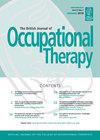Daily living skills in adolescents with and without language disorder, measured using the WHEEL OF INDEPENDENCETM framework
IF 1.3
4区 医学
Q3 REHABILITATION
引用次数: 0
Abstract
Introduction:Developing daily living skills, such as self-care, cooking and managing money, is a key priority for adolescents with special educational needs. Previous studies investigated the emergence of daily living skills in young people with a range of neurodevelopmental conditions. However, none focused on adolescents with language disorders, including developmental language disorder.Method:Two groups of 16-year-olds participated in this study: a typically developing group ( n = 88) and a developmental language disorder group ( n = 78), which was subdivided into participants with co-occurring motor difficulties ( n = 56) versus typical motor development ( n = 22). Data were collected using the WHEEL OF INDEPENDENCE™ framework, a daily living skills measurement tool. Between-group comparisons assessed whether there were significant differences in daily living skills between typically developing and developmental language disorder participants and between those with and without motor difficulties within the developmental language disorder group.Results:Findings revealed that typically developing participants had significantly better daily living skills than the developmental language disorder group. Within the developmental language disorder group, participants with motor difficulties showed marginally significantly lower daily living skills than those without.Conclusion:Adolescents with developmental language disorder experience challenges developing their daily living skills, compared to typically developing peers. This may be compounded if they have co-occurring motor difficulties. Further research could inform understanding of the mechanisms underlying these differences in order to develop tailored and effective interventions.使用独立之轮框架测量有语言障碍和无语言障碍青少年的日常生活技能
导言:对于有特殊教育需求的青少年来说,培养日常生活技能(如自我照顾、烹饪和理财)是一项重点工作。以往的研究调查了患有各种神经发育障碍的青少年日常生活技能的发展情况。方法:本研究由两组 16 岁的青少年组成:发育典型组(88 人)和发育性语言障碍组(78 人),其中发育性语言障碍组又分为并发运动障碍组(56 人)和发育典型组(22 人)。数据使用日常生活技能测量工具 "独立之轮"(WHEEL OF INDEPENDENCE™)框架收集。组间比较评估了典型发育参与者和发育性语言障碍参与者之间以及发育性语言障碍组中有运动障碍和没有运动障碍的参与者之间在日常生活技能方面是否存在显著差异。结论:与发育正常的同龄人相比,患有发育性语言障碍的青少年在发展日常生活技能方面面临挑战。结论:与发育正常的同龄人相比,患有发育性语言障碍的青少年在发展日常生活技能方面面临挑战,如果他们同时伴有运动障碍,情况可能会更加复杂。进一步的研究可以帮助人们了解这些差异背后的机制,从而开发出量身定制的有效干预措施。
本文章由计算机程序翻译,如有差异,请以英文原文为准。
求助全文
约1分钟内获得全文
求助全文
来源期刊

British Journal of Occupational Therapy
REHABILITATION-
CiteScore
2.20
自引率
15.40%
发文量
81
审稿时长
6-12 weeks
期刊介绍:
British Journal of Occupational Therapy (BJOT) is the official journal of the Royal College of Occupational Therapists. Its purpose is to publish articles with international relevance that advance knowledge in research, practice, education, and management in occupational therapy. It is a monthly peer reviewed publication that disseminates evidence on the effectiveness, benefit, and value of occupational therapy so that occupational therapists, service users, and key stakeholders can make informed decisions. BJOT publishes research articles, reviews, practice analyses, opinion pieces, editorials, letters to the editor and book reviews. It also regularly publishes special issues on topics relevant to occupational therapy.
 求助内容:
求助内容: 应助结果提醒方式:
应助结果提醒方式:


